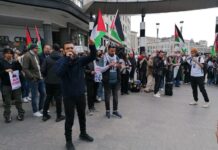
Samidoun activists in Greece joined fellow Palestinian and Greek organizers to protest on Wednesday, 29 May outside the German embassy in Greece. The protest came as part of an international rejection of a non-binding resolution passed by the German Bundestag (Parliament) on 17 May, labeling the Palestinian movement for boycott, divestment and sanctions (BDS) against Israel as “anti-Semitic.”
The protesters were blocked from reaching the embassy itself by a number of Greek police. When the demonstrators gathered in Syntagma square in the center of Athens, they were aked immediately by police where they were going. Police also demanded that the protesters not unfurl their banners and Palestinian flags before arriving at the German embassy, a 10-minute walk from the Square. Police accompanied the protesters all along the route – and then surprised them with a blockade on the road preventing them from demonstrating directly in front of the embassy.
While the resolution was justified by its supporters – including major political parties like the CDU, SPD, FDP and the Green Party (which, in Germany, has sided repeatedly with Israeli apartheid unlike its counterparts in Belgium, the U.S. and elsewhere) – as some sort of acknowledgment of German responsibility for the country’s crimes under the Nazi regime, in reality the resolution is a racist attack on Palestinian rights. Far from reflecting some sort of anti-fascist sentiment, the resolution followed an even more anti-Palestinian proposal for the criminalization of BDS initiated by the AfD, the far-right party known for its openness to pro-Nazi sentiments as well as its blatant anti-Arab and anti-Muslim racist propaganda, along with the ultra-capitalist FDP.
Indeed, the resolution came only days after several Jewish and Israeli activists were arrested and forcefully silenced by German police for speaking up against racism and apartheid at the so-called “Israeltag” event celebrating the Palestinian Nakba on 14 May in Berlin. It also comes only two months after former Palestinian political prisoner and torture survivor Rasmea Odeh was banned from speaking in Berlin and stripped of her European visa at the demand of the U.S. ambassador to Germany and the Israeli Minister of Strategic Affairs, Gilad Erdan. This is not to mention the case of the Humboldt 3, in which a Palestinian activist and two Jewish Israeli activists are facing criminal charges for protesting an Israeli Knesset member’s speech.
Erdan has gone on a global campaign attempting to silence Palestinian and international human rights defenders, particularly those who defend the rights of Palestinian prisoners in Israeli jails – which he also oversees as the Minister of Internal Security, repeatedly directing crackdowns that saw harsh limitations on water, intensified surveillance of female prisoners and the confiscation of thousands of books from imprisoned Palestinians.
The response in Greece was particularly notable because Germany has been not only a major player in attempting to legitimize Israeli apartheid but also in the economic devastation of Greece. Austerity initiatives in Greece have been initiated by the “Troika” and dominated by German demands for economic control of the country. At the same time, the German government has also recently 75 percent of submitted family reunification requests from refugees living in Greece. The EU, led by Germany, has dictated not only the “Fortress Europe” policies that have intensified death and drownings in the Mediterranean but also aim to cut even the basic housing and financial support received by refugees in Greece, often awaiting a chance to move to Germany themselves.
The protest also comes amid active BDS campaigns in Greece pushing for Greek companies – and the Greek government – to end partnerships with apartheid Israel. Greek popular support for the Palestinian cause remains and has consistently been high. However, the SYRIZA-led government’s capitulation to European Union demands on the Greek economy and austerity was also accompanied by another turn against Tsipras’ initial election program: ramping up military cooperation with the Israeli state. Greece is also a key player in the so-called “East Med Pipeline” project, which aims to transmit stolen Palestinian natural gas to Europe for the profit of Israeli and European corporations; Greek campaigners are urging an end to the project.
BDS campaigners in Greece recently won a victory as two companies, STASY and GEK-TERNA, pulled out of the final stages of the tender to build tram lines in occupied Jerusalem, linking the city with illegal settlements in the West Bank. BDS Greece reported that a range of organizations, including trade unions, student organizations and left political parties, had joined the campaign to call for the companies to pull out. In particular, they condemned the Greek government’s role as STASY is a publicly owned company. Earlier, Canadian firm Bombardier, Australia’s Macquarie and Germany’s Siemens already dropped out of the tender process for the settler tramway.
Samidoun in Greece is continuing to organize events and actions in support of justice for Palestinian prisoners and the Palestinian people. Get more information or follow the Samidoun Greece Facebook page at: https://www.facebook.com/%D8%B4%D8%A8%D9%83%D8%A9-%D8%B5%D8%A7%D9%85%D8%AF%D9%88%D9%86-%D8%A7%D9%84%D9%8A%D9%88%D9%86%D8%A7%D9%86-Samidoun-network-Greece-1114054352135500/
Discover more from Samidoun: Palestinian Prisoner Solidarity Network
Subscribe to get the latest posts sent to your email.




